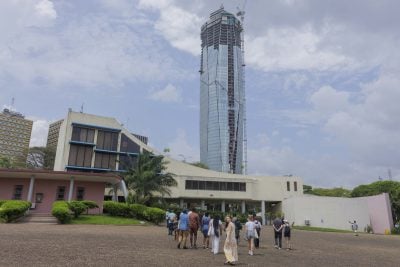Exiled in Mozambique and striving to keep his embattled movement alive, ANC president Oliver Tambo’s relentless quest for support against apartheid found a new outlet in February 1979.
Energised by the overthrow of the Shah of Iran just days earlier, Tambo wrote a gushing letter to the revolutionary cleric Ayatollah Khomeini, welcoming ‘the new Iran into the ranks of the anti-imperialist and anti-racist community of nations…Long live the Great Iranian Revolution”.
Thirty-six years later, and an ANC-led South Africa is once again at the forefront of attempts to welcome Iran back to the fold after the signing of a landmark international deal on its nuclear programme.
But while celebrating a shared revolutionary heritage remains very much on the agenda, the planned removal of global sanctions on Iran is sparking talk of renewed economic cooperation between the old friends.
“South Africa is one of our friends and we have excellent relations with the country,” says Mahmoud Soroush, first counsellor at the Iranian embassy in Pretoria.
“The two countries have the potential to cooperate in many areas, and in past years this cooperation has continued even during the sanctions.”
That relationship, boosted by Iran’s anti-apartheid credentials and South Africa’s consistent diplomatic support for a “peaceful” Iranian nuclear programme, has recently been the basis for a series of bilateral and trade summits between Tehran and Pretoria.
In May – two months before Iran’s deal with the United States and other world powers – South Africa’s international relations minister Maite Nkoana-Mashabane visited Tehran alongside a business and trade delegation. In August, shipping magnate Sello Rasethaba led a further delegation, while press rumours abound that millionaire businessman and deputy president Cyril Ramaphosa could be planning a visit soon.
The flurry of activity – Soroush points to planned cooperation in oil and gas, agriculture, telecoms and industry – suggests a renewed attempt to shift longstanding diplomatic relationships onto a more commercial footing.
That goal was previously stunted by the stringent sanctions regime, which complicated South Africa’s strongest commercial tie to Iran – the import of crude oil. South Africa receives around 30% of its imported oil from Iran, according to Ebrahim Deen, a researcher at the Afro-Middle East Centre. Under sanctions, that had to be routed through third parties – a strategy which irked Tehran and put a temporary strain on relations.
Iran is keen to resume its status as South Africa’s primary source of oil and kick-start a trade previously estimated at some 380,000 barrels per day, while for its part, South Africa’s status as a net importer of oil means that it is keen to resume a reliable supply as soon as possible.
Richard Mallinson, geopolitical analyst at Energy Aspects, says that could take several months owing to the continued exclusion of Iranian banks from global markets. And at a time of low global oil prices, undergoing the added complications of dealing with Iran could still prove more costly than alternatives.
“You still need the actual legal specifics of sanctions relief to begin, which is unlikely to be until early-to-mid next year. But companies will be weighing it up so you may see more in terms of non-binding agreements or headline announcements before you get tangible deals,” he said.
Sarosh Zaiwalla, an anti-sanctions lawyer who has fought cases on behalf of Iranian banks and oil entities, says that years of industry neglect are likely to be overcome quickly.
“It takes six months to a year because you have to redevelop the oil and gas fields … it’s not going to happen overnight but things are going to move pretty fast once sanctions are actually removed,” he said.
That desire to get ahead of the curve and re-engage goes beyond oil and gas companies. Sanctions have decimated bilateral trade, which amounted to just R162m ($12m) in 2013. Yet 2007’s figure of R1.5bn ($111m) hints at the previous efforts made by leading South African companies, including mobile operator MTN and chemicals manufacturer Sasol, to gain exposure to the market.
MTN, a 49% shareholder in IranCell, the second-largest Iranian operator, has been cut off from some $1.1bn stranded in the country, while Sasol sold its Iranian operations in 2013 for $238m.
Nevertheless, an emerging, consumer-driven Iran remains an attractive destination for outward-looking South African firms.
“SA companies such as MTN and PetroSA will now be able to operate more easily, and in terms of MTN the country will be able to recoup its 1bn in repayments that had been frozen as a result of sanctions. Moreover, other mining and service industries will begin showing interest in the largely untapped Iranian economy,” said the Afro-Middle East Centre’s Deen.
For South African firms willing to do business with Iran, paying close attention to the prevailing geopolitical situation remains essential. The Iranian nuclear deal remains contingent on a supportive US administration – by no means a given with Republican opposition and presidential elections in 2016 – and Iran’s compliance with the strict terms of the deal. Several sectors of the Iranian economy, particularly arms sales, are likely to remain off limits to South African firms.
Companies looking to do business with Iran will also need to learn how to navigate the country’s economy, argues Michael Rubin, a former Pentagon official and Iran expert at the American Enterprise Institute. The opaque nature of Iran’s economy, he says, and the lack of a commercial law framework, will complicate African attempts at engagement.
“What African countries are going to learn is that the way the Iranian economy is set up, most of the import/export as well as heavy industries with which they are going to want to get involved are actually run by companies affiliated with the Revolutionary Guards … When they’re doing business with Iranians, some of the Iranians are going to use that as an excuse to conduct activities those [African] countries don’t like.”
But if South African firms do chance their hand, they are unlikely to be alone. European trade delegations, including from Germany and Britain, have been queuing up to do business with their erstwhile enemy. For Ebrahim Deen, the years of close diplomatic ties sparked by Oliver Tambo’s 1979 letter could prove the decisive factor in competing for deals.
“Were a South African company and a European company to compete, the South African company can, in my opinion, expect to get at least a more sympathetic response from the Iranian authorities, contingent on the company’s capacity.”
David Thomas
Want to continue reading? Subscribe today.
You've read all your free articles for this month! Subscribe now to enjoy full access to our content.
Digital Monthly
£8.00 / month
Receive full unlimited access to our articles, opinions, podcasts and more.
Digital Yearly
£70.00 / year
Our best value offer - save £26 and gain access to all of our digital content for an entire year!
 Sign in with Google
Sign in with Google 


